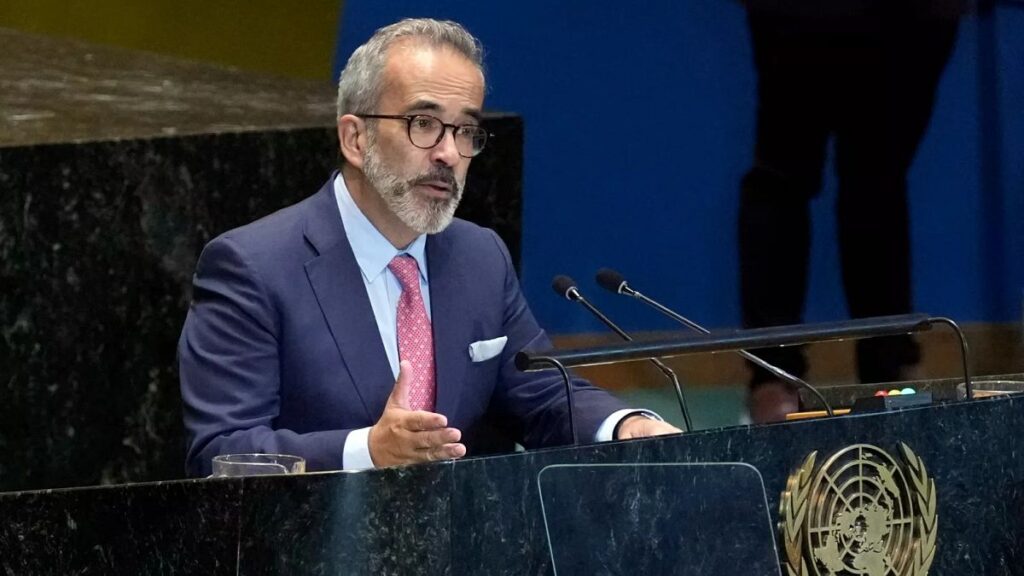On September 21, 2025, Portugal officially recognized the Palestinian state, as announced by the country’s Foreign Affairs Minister, Paulo Rangel, during the UN General Assembly in New York. This significant development comes amidst a flurry of similar declarations by other nations, including the United Kingdom, Canada, and Australia. The move is intended to support a two-state solution, which many leaders argue is crucial for lasting peace in the region.
The Portuguese government has reiterated its recognition of Israel’s right to exist while condemning recent violence, particularly the terrorist attacks that occurred on October 7, which were attributed to Hamas militants. This recognition has been met with strong disapproval from Israeli officials, who fear such actions will further destabilize the region.
As global attention shifts to the UN summit, with other countries like France also considering their stance, the international community is left to navigate the complex and contentious landscape surrounding the Israeli-Palestinian conflict.
| Article Subheadings |
|---|
| 1) Overview of Portugal’s Recognition |
| 2) International Reactions and Implications |
| 3) The Impact on Israeli-Palestinian Relations |
| 4) Statements from Global Leaders |
| 5) Future Prospects and Responses |
Overview of Portugal’s Recognition
On September 21, 2025, Paulo Rangel, the Portuguese Foreign Affairs Minister, made a significant announcement during a UN session in New York that Portugal officially recognizes the state of Palestine. This action aligns Portugal with a growing trend among nations acknowledging Palestinian sovereignty, especially ahead of the United Nations General Assembly where multiple declarations are expected.
The recognition is portrayed as a pivotal step toward endorsing a two-state solution, which aims to provide a peaceful resolution to the ongoing conflict. In his statement, Rangel highlighted the importance of supporting Palestine while also acknowledging Israel’s right to exist and emphasizing the need to address security concerns for both states. Such a balanced approach aims to foster dialogue and encourage peace in a region fraught with tension.
International Reactions and Implications
The recognition by Portugal has sparked international conversations regarding its implications for global diplomacy and the Israeli-Palestinian conflict. Following Portugal’s move, the United Kingdom, Canada, and Australia also declared their recognition of Palestine, signaling a broader commitment to support Palestinian statehood within the international community.
Israeli authorities expressed strong disapproval of these recognitions, asserting that they would only serve to embolden militant groups like Hamas. Israeli Prime Minister Benjamin Netanyahu condemned the actions, warning that they would destabilize the region further. Such reactions illustrate the complex dynamics surrounding the recognition of Palestinian statehood and the multitude of views on its significance.
The Impact on Israeli-Palestinian Relations
The official recognition of Palestine by Portugal and other nations could significantly alter the trajectory of Israeli-Palestinian relations. The renewed acknowledgment of Palestinian sovereignty emphasizes the legitimacy of Palestinian claims for statehood. However, Israeli leaders have indicated that they perceive this as a reward for terrorism, referencing the horrific attacks perpetrated by Hamas.
In a response to these recognitions, Israeli Minister of National Security Itamar Ben-Gvir suggested raising discussions about annexing the West Bank during the next cabinet meeting. This underscores the potential for growing tensions as different narratives about the conflict continue to clash.
Statements from Global Leaders
Leaders from various nations have voiced their opinions regarding the impact of recognizing a Palestinian state. Keir Starmer, the Prime Minister of the UK, remarked that collective efforts must be united to hope for a peaceful future. His statements advocate for an end to violence and suffering while promoting a two-state solution as essential to peace and security for both Israelis and Palestinians.
Countries such as France are also expected to announce similar recognitions during the UN summit, placing additional pressure on nations to define their stance on the evolving situation in the Middle East. As more countries align with the Palestinian cause, the international community’s approach to the conflict could undergo substantial changes.
Future Prospects and Responses
As the UN summit approaches, numerous countries are contemplating their responses to the events surrounding Palestinian state recognition. The prospect of a series of new recognitions may serve to further polarize an already divided international community on the issue. With tensions already high, nations will need to engage diplomatically to ensure that increased recognition does not exacerbate violence or retaliation in the region.
In summary, the international discourse surrounding Palestinian statehood is entering a crucial phase, where recognition by European and Commonwealth nations could either facilitate dialogue or create additional complexities. The situation calls for careful, thoughtful leadership both globally and within the region to navigate the way forward.
| No. | Key Points |
|---|---|
| 1 | Portugal recognized Palestine, emphasizing a two-state solution for lasting peace. |
| 2 | Other nations like the UK, Canada, and Australia followed suit, signaling a collective move. |
| 3 | Israeli authorities condemned the actions, fearing destabilization and emboldening of Hamas. |
| 4 | Global leaders are calling for a united approach toward peace and security. |
| 5 | Future diplomatic interactions will be pivotal in either resolving or escalating tensions. |
Summary
The decision by Portugal and other nations to recognize Palestine marks a significant moment in international politics. While aimed at promoting a peaceful resolution to the Israeli-Palestinian conflict, these actions will inevitably influence diplomatic relations and regional stability. As the world watches, the unfolding responses will play a crucial role in determining the next steps in navigating this long-standing conflict.
Frequently Asked Questions
Question: What prompted Portugal’s recognition of Palestine?
The recognition was part of an effort to support a two-state solution for lasting peace, particularly ahead of the UN General Assembly.
Question: How have Israeli officials reacted to the recent recognitions?
Israeli officials have expressed strong disapproval, suggesting that the recognition will further destabilize the region and embolden militant groups.
Question: What are the broader implications of several nations recognizing Palestine?
This recognition could either facilitate meaningful dialogue or escalate tensions in the region, influencing future diplomatic interactions.


